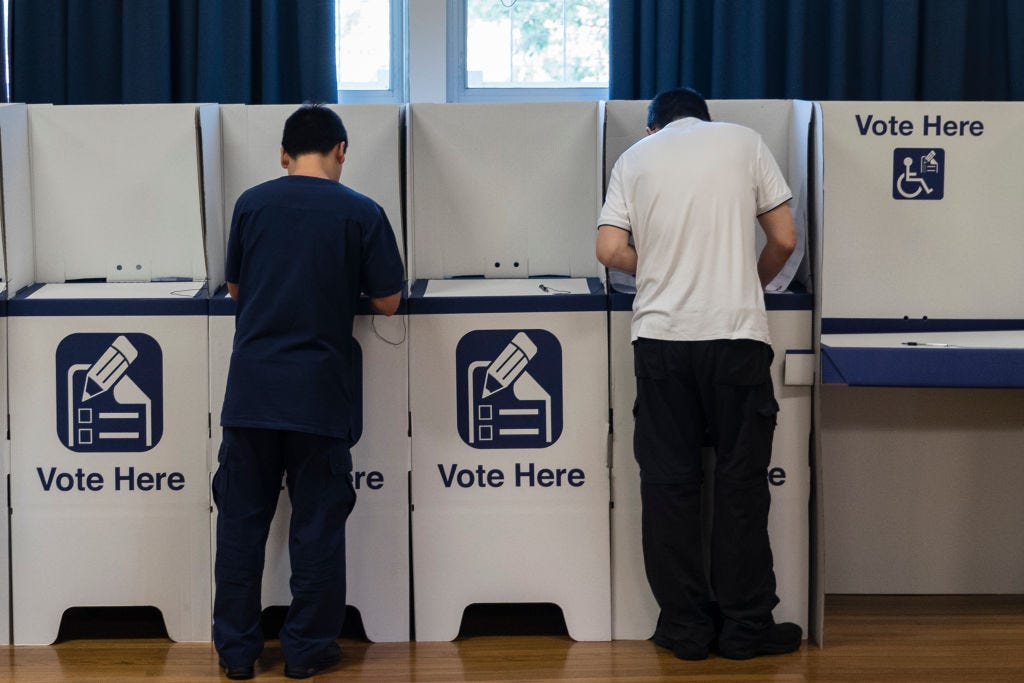BOOK THIS SPACE FOR AD
ARTICLE AD
New South Wales Residents Head To Polls In State Election
Image: Brook Mitchell/Getty ImagesThe NSW Electoral Commission (NSWEC) has confirmed it will scrap using the iVote system for next year's state election as there is a lack of confidence it will be ready in time.
The decision comes after an unknown number of voters were unable to cast a vote during local elections at the end of last year due to the iVote online voting system suffering a failure for a portion of the voting period.
An NSWEC investigation into the local election bungle found the system failure impacted the outcomes of three local elections.
The NSWEC had already shelved the iVote system for "extensive reconfiguration and testing" to resolve the issues encountered during local elections, but the latest move indicates the system will not be used until at least March 25 next year.
"The current version of the iVote software used by the Electoral Commission will be phased out and the short runway for configuring and testing a new version before March 2023 means the Electoral Commissioner cannot be confident an updated system adapted for elections in NSW will be ready in time," the NSWEC said in a statement.
The decision to scrap using the iVote system until next year at the earliest also means it will not be used for any intervening by-elections in the lead up to the state election.
For core users of the iVote system, people with disability and those who are based overseas or in remote areas, the NSWEC said it would explore other ways to support their participation in future elections. In particular, the electoral commissioner will be recommending to the NSW Government for ordinary telephone voting to still be made available for blind and low vision electors.
During the system failure's aftermath, Dr Vanessa Teague, a cryptographer with a particular interest in privacy and election security, criticised the flaws within the iVote system.
"Every serious investigation of iVote found serious problems," Teague tweeted in December in light of the iVote failure.
Teague's comments at the end of last year were not her first in warning about the iVote system's flaws. Starting in 2015, she and her colleagues found numerous flaws in iVote, problems that NSWEC had previously downplayed.
At the federal level, Australia's electoral commissioner launched a new disinformation register last week to debunk misleading and deceptive information regarding how elections are run to protect the integrity of the country's upcoming federal election.
The Australian Electoral Commission said its main focus for the upcoming federal election would be handling the recent uptick of election conspiracy theories circulating online.
Social media companies, meanwhile, have given assurances that they will allocate more resources for monitoring election disinformation and misinformation for the upcoming Australian federal election. On Tuesday, Meta unveiled its plan for handling election misinformation, which it labelled as its most comprehensive package ever in Australia.
Related Coverage
NSWEC finds iVote system failure may have impacted three local election outcomesTampering with ACT overseas e-voting system did not need key, researcher findsNSW will not use iVote again for elections until 'extensive reconfiguration' is made
No surprise: NSW iVote fails during local council elections
Meta reiterates politician claims will not be fact-checked for Australian federal election
Australia launches federal election disinformation register to fight mistruths
Social media platforms have 'assured' 24/7 misinformation monitoring for Australia's upcoming federal election
.png)
 2 years ago
158
2 years ago
158 














 Bengali (Bangladesh) ·
Bengali (Bangladesh) ·  English (United States) ·
English (United States) ·